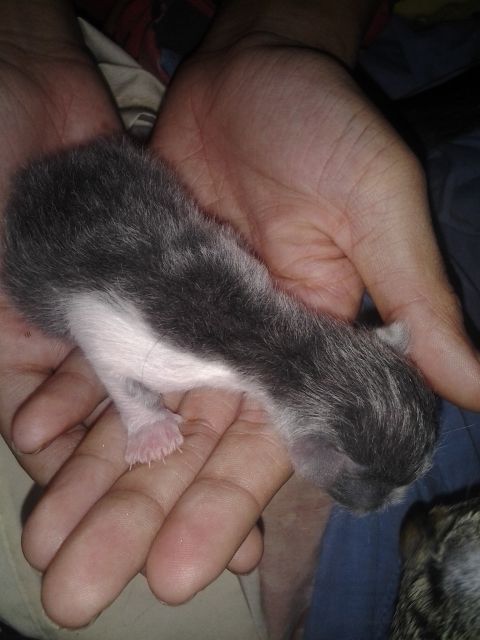Questionthank you for your informative reply. My cat bites and attacks mostly when I attempt to put on her harness to take her for her walk or when we have to come in the house after her walk. She seems like a cat who is best suited to live outdoors and she cries constantly to go outside. She actually cries and jumps on the doorknob all night trying to get out! We were letting her out at night and then letting her in the next morning, but our neighbors were complaining about her (that's a whole different story) so we stopped doing that and now I walk her twice a day on a harness and leash.
-------------------------
Followup To
Question -
I have a 2 year old Cymric (long haired Manx) cat who I just adore. The problem is that she bites and attacks for no apparent reason. My vet suggested spraying her with water, but that doesn't help. Actually, she loves water so that has no effect. Do you have any suggestions to stop this behavior.
Answer -
I'm sorry, it's late at night and I can't resist :-) . . . my suggestion is that you get a vet who understands cats a little better!
Jeez. . . the water squirt trick is pretty basic but it doesn't work well with about 50% of all cats because either a) they like water, like yours, or b) they simply cannot make a connection between a negative experience like getting squirted and the act of biting/attacking. To them/her, it is just doin' what comes naturally. Aversive conditioning is great for training dogs, but if you want to train a cat, you have to make it worth the cat's while to do what you want it to do, rather than punish it for doing what you don't want it to do. Unfortunately, this means that when you are dealing with behavioral problems like aggressiveness, sometimes the best recourse is a psychopharmacological one. (Also the easiest on both you and the cat!)
Aggressiveness in cats can be due to overstimulation, anxiety, or several other things, and you need to try to zero in on the root cause in order to find the correct medication. I had an aggressive female who was overprotective of her kittens to the point that she attacked anything that smelled like another cat (which made life REAL interesting when I came into the kitten room to clean and feed!!!) and also needy, anxious cats who were so frustrated at the lack of attention they were getting that they would attack when they finally got it. Two different problems, two different prescriptions (Buspar for the momcat, Prozac -- really! -- for the other two), both successfully resolved.
So, first question -- how much time do you spend actually interacting with your cat and is it possible for you to add to this time? Manx are a fairly mellow breed but they are also very active. Is it possible for you to schedule a solid half hour of heavy duty interactive play with a feather toy or laser light or something else that will make her run around and chase it and work up a little kitty sweat? I have found that this makes a real difference and is worth trying before you try medication.
If you try it and there is no decrease in the overall level of aggressiveness, then talk to your vet about trying some medication. If he/she isn't up on the possibilities or doesn't approve of such treatment for animals, find a new vet and/or write back with more detail about the circumstances under which this behavior typically occurs. I can't get you a prescription, but I have access to respected references that would give me ideas you could then suggest to your vet, if he/she is open to new information.
Hope this gives you some ideas/hope.
iris
AnswerApologies for delay in responding, I got sick and was also dealing with a close friend's cat emergency.
Now that you are giving me this additional information, I am even more convinced that this is the type of situation that would best benefit from a combination of drug therapy and behavior modification. Clomipramine (brand name Anafranil) is one drug that is supposed to be helpful with dominance aggression in both dogs and cats. I have no personal experience with it but I do suggest that you talk to your vet about trying a prescription for 2-3 weeks. While your cat is on the meds, start trying to reduce the stress she associates with the harness by bringing it out and giving her a treat, then putting it on and giving her another treat, etc. Don't think of the meds as something she will have to STAY on, just something that you are using to supplement the behavior modification.
If your vet isn't comfortable with this type of prescription, ask for a referral to a behavioral therapist. There are a lot of them around and if your vet doesn't know any, contact the nearest major animal hospital or vet school in your area. I am sure you will find someone and also pretty sure that this is something they can help you work through.
Good luck
iris

 Stray kitten
Question
My Kitten
Hi i was wondering how much t
Stray kitten
Question
My Kitten
Hi i was wondering how much t
 Cats Fighting
Question
Big Cat
Hello.i have a cat named lucky.he is a
Cats Fighting
Question
Big Cat
Hello.i have a cat named lucky.he is a
 Trouble with my Two female cats.
Question
The kitten Two Cats
Hello, I have
Trouble with my Two female cats.
Question
The kitten Two Cats
Hello, I have
 Throwing Up and Pooping
Question
Pepper
Hi,
Well my cat is 12 years old and la
Throwing Up and Pooping
Question
Pepper
Hi,
Well my cat is 12 years old and la
 Kitty Peeing
Question
Howie
Our kitten is about 8 months old
Kitty Peeing
Question
Howie
Our kitten is about 8 months old